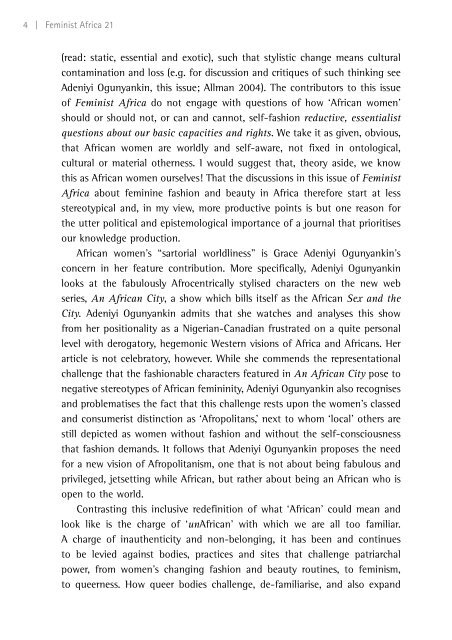The politics of fashion and beauty in Africa
fa21_proof_3
fa21_proof_3
Create successful ePaper yourself
Turn your PDF publications into a flip-book with our unique Google optimized e-Paper software.
4 | Fem<strong>in</strong>ist <strong>Africa</strong> 21<br />
(read: static, essential <strong>and</strong> exotic), such that stylistic change means cultural<br />
contam<strong>in</strong>ation <strong>and</strong> loss (e.g. for discussion <strong>and</strong> critiques <strong>of</strong> such th<strong>in</strong>k<strong>in</strong>g see<br />
Adeniyi Ogunyank<strong>in</strong>, this issue; Allman 2004). <strong>The</strong> contributors to this issue<br />
<strong>of</strong> Fem<strong>in</strong>ist <strong>Africa</strong> do not engage with questions <strong>of</strong> how ‘<strong>Africa</strong>n women’<br />
should or should not, or can <strong>and</strong> cannot, self-<strong>fashion</strong> reductive, essentialist<br />
questions about our basic capacities <strong>and</strong> rights. We take it as given, obvious,<br />
that <strong>Africa</strong>n women are worldly <strong>and</strong> self-aware, not fixed <strong>in</strong> ontological,<br />
cultural or material otherness. I would suggest that, theory aside, we know<br />
this as <strong>Africa</strong>n women ourselves! That the discussions <strong>in</strong> this issue <strong>of</strong> Fem<strong>in</strong>ist<br />
<strong>Africa</strong> about fem<strong>in</strong><strong>in</strong>e <strong>fashion</strong> <strong>and</strong> <strong>beauty</strong> <strong>in</strong> <strong>Africa</strong> therefore start at less<br />
stereotypical <strong>and</strong>, <strong>in</strong> my view, more productive po<strong>in</strong>ts is but one reason for<br />
the utter political <strong>and</strong> epistemological importance <strong>of</strong> a journal that prioritises<br />
our knowledge production.<br />
<strong>Africa</strong>n women’s “sartorial worldl<strong>in</strong>ess” is Grace Adeniyi Ogunyank<strong>in</strong>’s<br />
concern <strong>in</strong> her feature contribution. More specifically, Adeniyi Ogunyank<strong>in</strong><br />
looks at the fabulously Afrocentrically stylised characters on the new web<br />
series, An <strong>Africa</strong>n City, a show which bills itself as the <strong>Africa</strong>n Sex <strong>and</strong> the<br />
City. Adeniyi Ogunyank<strong>in</strong> admits that she watches <strong>and</strong> analyses this show<br />
from her positionality as a Nigerian-Canadian frustrated on a quite personal<br />
level with derogatory, hegemonic Western visions <strong>of</strong> <strong>Africa</strong> <strong>and</strong> <strong>Africa</strong>ns. Her<br />
article is not celebratory, however. While she commends the representational<br />
challenge that the <strong>fashion</strong>able characters featured <strong>in</strong> An <strong>Africa</strong>n City pose to<br />
negative stereotypes <strong>of</strong> <strong>Africa</strong>n fem<strong>in</strong><strong>in</strong>ity, Adeniyi Ogunyank<strong>in</strong> also recognises<br />
<strong>and</strong> problematises the fact that this challenge rests upon the women’s classed<br />
<strong>and</strong> consumerist dist<strong>in</strong>ction as ‘Afropolitans,’ next to whom ‘local’ others are<br />
still depicted as women without <strong>fashion</strong> <strong>and</strong> without the self-consciousness<br />
that <strong>fashion</strong> dem<strong>and</strong>s. It follows that Adeniyi Ogunyank<strong>in</strong> proposes the need<br />
for a new vision <strong>of</strong> Afropolitanism, one that is not about be<strong>in</strong>g fabulous <strong>and</strong><br />
privileged, jetsett<strong>in</strong>g while <strong>Africa</strong>n, but rather about be<strong>in</strong>g an <strong>Africa</strong>n who is<br />
open to the world.<br />
Contrast<strong>in</strong>g this <strong>in</strong>clusive redef<strong>in</strong>ition <strong>of</strong> what ‘<strong>Africa</strong>n’ could mean <strong>and</strong><br />
look like is the charge <strong>of</strong> ‘un<strong>Africa</strong>n’ with which we are all too familiar.<br />
A charge <strong>of</strong> <strong>in</strong>authenticity <strong>and</strong> non-belong<strong>in</strong>g, it has been <strong>and</strong> cont<strong>in</strong>ues<br />
to be levied aga<strong>in</strong>st bodies, practices <strong>and</strong> sites that challenge patriarchal<br />
power, from women’s chang<strong>in</strong>g <strong>fashion</strong> <strong>and</strong> <strong>beauty</strong> rout<strong>in</strong>es, to fem<strong>in</strong>ism,<br />
to queerness. How queer bodies challenge, de-familiarise, <strong>and</strong> also exp<strong>and</strong>



